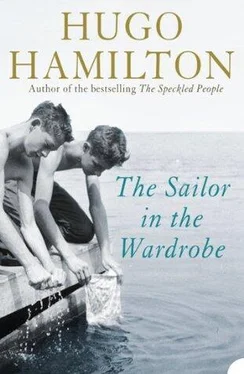My mother said I should stop and not go down there any more. She gave me a book called Crime and Punishment , and I wondered if she got it from Onkel Ted, because after reading it, you can never believe in God again as long as you live. The book is about a student in Moscow who murders an old woman living alone in the same building. Reading it makes you think how easy it is to take somebody’s life. And maybe that’s why they gave me the book, because they want me to know that your crime stays with you for the rest of your days, like a partner who never leaves your side.
Up to the time I read that book, I thought murder was wrong because everybody said it was wrong. But then I started thinking about how morality was invented in the first place, way back in time, before there was anything like police and courts and the ten commandments. How did people decide that killing was wrong? They must have discovered that murder was impractical because dead people had relatives and friends who would come looking for revenge. It would keep going around in circles, people killing and punishing each other into infinity. Maybe that’s what a conscience is, I thought, imagining the consequences of your actions. Maybe that’s how compassion started in the first place, people imagining what other people felt and how you would feel if the same thing happened to one of your own people. I thought about all the people like Eichmann who had no feelings at all. But even people with no feelings and no conscience, they still had an ego. Every criminal wants to be loved and respected. Even if they don’t want forgiveness, they still want recognition. They don’t want to be forgotten, because the loneliness of being a murderer is too hard to live with.
At the end of the book there’s a good feeling because Raskolnikov sits on a pile of logs looking out at the river. It’s a wide river with nothing beyond it, only the steppe. He’s in prison in Siberia and he still has to serve seven years of his sentence, but he can see that at the end of those seven years, he will have paid for his crime. He’s happy because he hears the nomads singing on the far side of the river and he thinks time has moved on and his guilt has come to an end. He knows that forgiveness is coming and soon he will become a new person.
My mother said murder was a failure of the imagination. I could feel the memory of war and fear and regret in her words. She told me she read a famous line by a writer called George Steiner who said history had taught us that you could live a happy life with your family and listen to Bach in the evening and go out the next day to commit the most horrible crimes in Auschwitz. She said Bach was not the problem and hoped I would always have enough imagination left to remember what it’s like to be inside somebody else’s shoes. She said it was not difficult to murder somebody. It was the opposite. It’s hard not to murder somebody. And it’s even more difficult to make up for it afterwards.
‘The hardest thing is to un-murder somebody,’ she says. ‘You need a big imagination to be able to do that, to bring somebody back to life. As long as a dead person is remembered by one single person, they are not quite dead yet. You can keep somebody alive for ever in your memory.’
When I showed Stefan the place where Peggy Flynn was murdered, he didn’t say much. There was nothing for him to say and he just stared at the rocks without asking any questions. I noticed him going quiet in the days after that and it wasn’t long before he announced that he was leaving to travel around the country on his own. My mother was surprised that he didn’t want to talk about the ancient book which he had been sent to collect. She didn’t want to leave it until he came back from his tour, but when she brought up the subject, Stefan seemed to have no interest at all, only in maps of Ireland.
On the last day before he left, I went swimming with him. I brought him up to a secret place that I had found some time ago and shown nobody else in the world. Up there on the hill, by the big terrace of white houses overlooking the bay, there was a small lane leading down to the rocks. It was overgrown, but I got a stick and hacked a path through, until we came out at the bottom and we could see the whole bay with the long sandy beach running all the way into the distance. We could see crowds of people on the beach and the train running along the coast. We swam off the rocks and I saw that Stefan had a mole on his back, like a birthmark. I could see a thin black line of hair running down from his belly button and disappearing into his togs. His chest was strong and he was a great swimmer.
We sat down in a sunny place where nobody ever went and we had the whole bay to ourselves. The rocks were hot, like granite radiators. I could smell the dried seaweed around us like the smell of packet soup. When I pushed a rock aside it revealed all the sea crawlers and jumping sand-fleas underneath. Stefan threw a few rocks around just to hear them clacking against each other. We didn’t need to talk, but then he started asking me about my father, wondering why I went along with his rules and why he would still not allow us to speak English. He wanted to know if it was always like that in our house, listening to pop songs on the radio in secret. I could not answer him. I didn’t know how to talk about my father to people outside the family. Other lads all called their fathers ‘the old man’ or ‘the oul fella’, but I didn’t like it. I didn’t know how to be disloyal.
‘I don’t speak to my father,’ Stefan told me.
It sounded like he was encouraging me to do the same.
‘I haven’t spoken to him in a year,’ he said.
‘Why?’ I asked.
‘He saw people being executed.’
I asked him where and he looked out over the water as if he could remember seeing it himself with his own eyes.
‘Women. Naked women,’ he said. ‘He was in the war, in the East, in Russia.’
I didn’t know how to ask him anything else. I wanted to go away for a while and come back with more questions, even though I knew he was leaving and it might be too late. He spoke about his own father as if he was a murderer. I thought of my father and began to wonder if he was a murderer, too, and wanted to kill people for Ireland. I thought of how I would stop talking to him, only that my mother would start whispering into my ear, saying that if I stop talking to my own father, I will not be able to talk to myself either.
We sat watching a small fleet of yachts coming around by the island, all leaning in the same direction. Above us every now and again a train passed by along the edge of the cliff and disappeared, rushing into the tunnel with a sudden muffled sound. Seagulls threw themselves off the face of the cliff and balanced in the air. In the big terrace of white houses, there was a woman leaning out the window looking far off at the sugarloaf mountain. Stefan told me that he was going to get as far away as possible from his father and from his country. I was afraid of what he was saying. I had never heard anyone speaking so openly about themselves before. He said he had a girlfriend in Mainz and she was very beautiful. He told me that he had slept with her and it was something he would never forget. But it was all wrong, he said, because he had lost all sensation in his heart. He said he felt like a murderer with no feelings. He was like the un-dead and that’s why he had come to Ireland, so he could touch things and breathe again. We didn’t look at each other while he was saying all this. We kept our eyes on the water, on the yachts, and the seagulls who looked like they were imitating the yachts, racing each other at an angle in the air above us.
The harbour is shaped like an Irish harp with the road running straight along one side, a bow-shaped pier along the other side, and a perpendicular pier at the top where the gap opens up for the harbour mouth. All the ropes tying the boats down to their moorings are the strings, sometimes tight, sometimes loose. The road is bordered by granite bollards and looping chains. At the bulging side of the harp, the granite pier is built up with cottages and fishermen’s huts. Most of the sheds are no longer owned by fishermen, apart from Dan Turley’s which is the last one on the pier, closest to the harbour mouth. The bottom end of the harp is the shallow end of the harbour with a slip for small boats to enter the water, while right across from Dan Turley’s shed, there is a crane where larger boats are lowered with straps and you can hear the wood creaking with the strain. They say the harbour was constructed around a natural cove which had been used for smuggling long ago until the road was built. There are small working harbours like this all along the coast, as well as the big ferry harbour with its two granite arms reaching out and a lighthouse at each end. Our harbour is used mostly for pleasure boats now and for fishing, mackerel, lobster and crab. If it rains, we all hang around inside Dan’s shed, smoking and talking, watching the pier being washed clean until it clears up and you can see the steam rising all around. If the sun shines for a while, you can feel the heat left behind in the granite long after it’s dark. Sometimes Packer goes up to the shop and comes back with a half-dozen ice pops to share out and everybody laughs at the way Dan Turley eats his like a small boy, biting off a big chunk and concentrating hard while he’s juggling it around in his mouth before he finally swallows it and gets the brain freeze.
Читать дальше
Конец ознакомительного отрывка
Купить книгу












